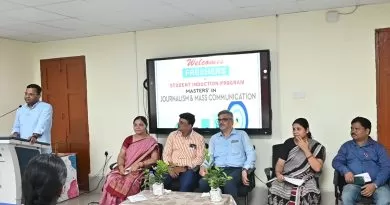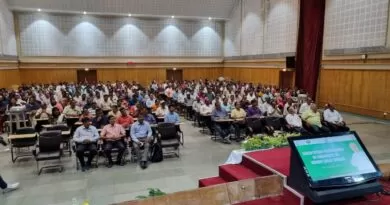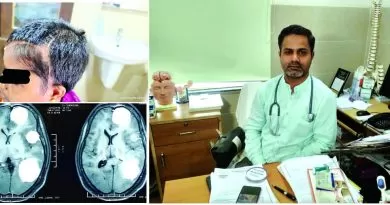Balancing smart tech with human element is the key: Prof Srivastava

Bhubaneswar: The evolution of smart technology has been revolutionising life, but its long term impact has to be assessed, Prof Deepak Kumar Srivastava, vice-chairman of University Grants Commission (UGC), said on Wednesday.
“Use of technology is enhancing the productivity of the human brain. The ability to think, act and analyse is being challenged by excessive use of technology,” Prof Srivastava said while delivering the Silver Jubilee Lecture at the Siksha ‘O’ Anusandhan (SOA) Deemed to be University here.
He said there was no need to go back to the past or renounce smart technology but one has to learn to develop the higher consciousness necessary to use technology in the optimal manner “helping us outwardly, but not limiting us inwardly”.
“We need to set our technology in the background, learn how to detach from it and connect to it when necessary,” he said while speaking on the subject ‘Balancing Smart Technology with Human Element for an Enlightened Future.’
Referring to latest innovations like ChatGPT, an Artificial Intelligence chatbot, Prof. Srivastava said while such technology is useful but needed to be controlled with focus on human conscientiousness. “If necessity is the mother of invention, human element is the soul of human existence,” he said.
With the arrival of smart watches, smart TV, smart phones, smart calculators and smart automobiles, the world was on the cusp of the 5th Industrial Revolution which encompassed the notion of cordial and harmonious human-machine collaborations, the expert in human relations management and labour relations, said.
Prof Srivasatava said the policy makers and certain governments have been very serious about providing technology access to people of different age groups. For example, several governments including United Kingdom, Scotland and Singapore had banned the use of calculators in schools to encourage cognitive thinking and help development of the brain as also basic numeracy skills in children.
ChatGPT has been banned in public schools in New York to safeguard the critical thinking and problem solving skills in children, he said. The impact of ChatGPT is still being discussed across the globe and it depends on policy makers as to how to use such technology products, Prof. Srivastava said.
In India, he said, the government has been proactive in using technology in the education system and it had been kept at the minimal level for early education of children as the major responsibility rested with the anganwadi workers and others. The National Education Policy (NEP) focused on children’s physical, motor, cognitive, socio-emotional, cultural, artistic, communication, literacy and numeracy development skills, he said adding the government had launched ‘Vidya Pravesh’, a pre-school module developed by NCERT for preparing children entering Grade I.
Stating that India was on its way to become ‘Vikshit Bharat’ by 2047, Prof Srivastava said the role of the university was to instill among the students a deep rooted pride in being Indian not only in thought but also in spirit, intellect and deeds.
SOA’s vice-chancellor Prof Pradipta Kumar Nanda presided over the programme which was also addressed by the pro-vice chancellor Prof Bibhuti Bhushan Pradhan and dean (Students’ Welfare) Prof Jyoti Ranjan Das. Prof Renu Sharma, additional dean (Student Affairs), ITER proposed the vote of thanks.



